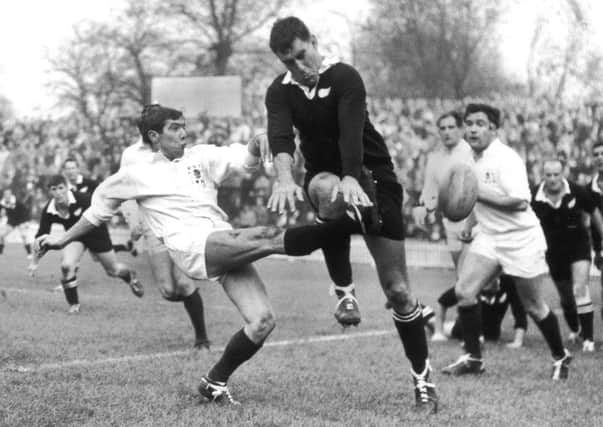Rugby world mourns loss of All Blacks legend Colin Meads


Meads played 133 times for the All Blacks between 1957 and 1971, appearing in 55 Tests, and the King Country lock earned an international reputation for his fierce play.
“His achievements in the black jersey are part of the All Blacks legacy and his loss will be felt over the world,” Hansen said.
Advertisement
Hide AdAdvertisement
Hide AdMeads was diagnosed with pancreatic cancer in August last year, and died yesterday morning at Te Kuiti Hospital.
“On behalf of the All Blacks, we’d like to pass on our condolences and sympathy to the family,” Hansen said. “He is a legend of the game, a legend of New Zealand’s game, and it is always sad when one of the big Kauri trees fall – and that is what has happened.”
Meads captained the All Blacks in the famous series against the British and Irish Lions in 1971 and was named New Zealand’s player of the century by the New Zealand Rugby Football Union in 1999.
Nicknamed ‘Pinetree’ by team-mate Kevin Briscoe in 1958, Meads’ reputation for fearless and tough play was sealed when he played an entire match with a broken arm in 1970.
“This is an incredibly sad day,” All Blacks captain Kieran Read said. “Sir Colin was an icon of our game. I met him a few times and he was always keen to share a beer and have a yarn. He is an absolute legend, not only in New Zealand rugby, but in world rugby. On behalf of all players, our thoughts go out to his family at this time.”
Meads was involved in rugby all his life, going into coaching and management, as well as administration, after his playing days were over.
“His ability to play the game first and foremost and his passion for rugby long after he stopped playing – he was a coach; he was a manager for the All Blacks, and at grassroots he was involved,” Hansen added.
“He didn’t just play for the All Blacks; he didn’t just play for King County or his club; he just gave back in many other ways and he is true rugby. That will be his legacy.”
Advertisement
Hide AdAdvertisement
Hide AdAs well as his life in rugby, New Zealand prime minister Bill English said Meads would also be remembered simply as a good man.
“Sir Colin represented what it means to be a New Zealander. He was no-nonsense, reliable, hardworking, warm and very generous with his time,” he said on Twitter. “A sad day for New Zealand rugby and for New Zealand. Sir Colin was not only a great All Black but also a genuinely good Kiwi bloke. He will be missed.”
Meads was hardened by his life as a sheep farmer in the rugged King Country district of New Zealand’s North Island.
English added: “I remember when I was younger hearing stories about how he used to shear sheep all day and go running at night. I thought I’d give it a go. I quickly learned the Meads legend was built on physical and mental toughness.”
Meads was regarded as New Zealand’s greatest All Black, even when players of the modern era such as Richie McCaw, who played 148 Tests, surpassed his record for Test appearances.
With a reputation as an enforcer at a time – in the absence of video replays – when physical violence was more common in rugby, he became only the second All Blacks player to be sent off in a Test match, against Scotland in 1967, though he was considered unlucky in that instance.
Meads stayed on his farm near the small township at Te Kuiti until his death. In June, a bronze statue honouring him was opened in the Te Kuiti town centre and he was present at the unveiling, his last public appearance.
Meads is survived by wife Verna and their five children Karen, Kelvin, Rhonda, Glynn and Shelley, their 14 grandchildren and seven great grandchildren.